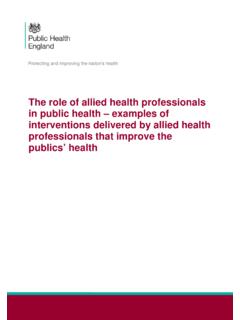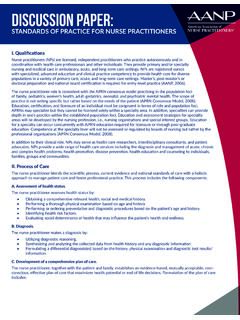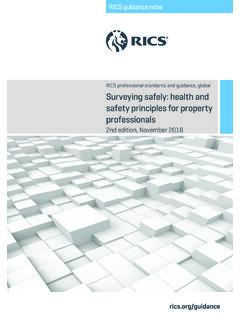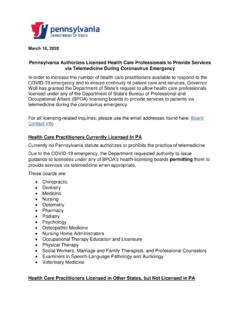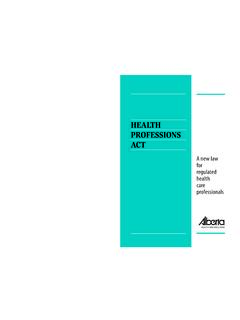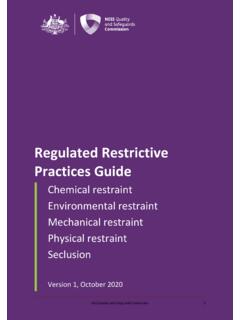Transcription of Regulation of Health Care Professionals Regulation of ...
1 Regulation of Health care Professionals Regulation of Social care Professionals in England The Government's response to Law Commission report 345, Scottish Law Commission report 237. and Northern Ireland Law Commission report 18. (2014) Cm 8839 SG/2014/26. Cm 8995. Regulation of Health care Professionals Regulation of Social care Professionals in England The Government's response to Law Commission report 345, Scottish Law Commission report 237 and Northern Ireland Law Commission report 18 (2014). Cm 8839 SG/2014/26. Presented to Parliament by the Secretary of State for Health by Command of Her Majesty January 2015. Cm 8995. Crow n copyri ght 2015. You may re-use this information (excluding logos) free of charge in any format or medium, under the terms of the Open Government Licence To view this licence visit or email: Where third party material has been identified, permission from the respective copyright holder must be sought.
2 This publication is available at Any enquiries regarding this publication should be sent to us at Public Enquiries Unit, Department of Health , Richmond House, 79 Whitehall, London SW1A 2NS or e-mail: Print ISBN 9781474113670. Web ISBN 9781474113687. Printed in the UK by the Williams Lea Group on behalf of the Controller of Her Majesty's Stationery Office ID 06010501 01/15 46547 19585. Printed on paper containing 75% recycled fibre content minimum Contents Foreword .. 1. Executive 4. 1. Structure of Reform .. 8. 2. Regulatory Bodies .. 15. 3. Registers and Registration .. 28. 4. Education, Standards and Practice .. 48. 5. Fitness to Practise .. 56. 6. The Role of the PSA .. 81. Appendix - Full Table of Responses .. 85. 1. Foreword We would like to express our gratitude to the Law Commissions for the work they have done reviewing the complex professional Regulation legislation, and the comprehensive report they published in April 2014.
3 We have worked closely with the Law Commissions and agree with their view that the framework for holding Health and social care Professionals to account needs to be fit for the future, creating significant benefits in terms of public protection. In considering our response there has been close working with the regulatory bodies, and the professional Standards Authority to ensure their views have been taken into consideration. We would like to thank them for their hard work and dedication to reforming the system of professional Regulation . In 2011, the White Paper Enabling Excellence: Autonomy and Accountability for Healthcare Workers, Social Workers and Social care Workers (Enabling Excellence)1. announced the Government's intention to ask the Law Commissions to look into simplifying and modernising the current legislative framework.
4 Enabling Excellence made clear that any review of Regulation policy should have the overriding objective that the system should focus on delivering safe and effective care , and should take close account of the Hampton principles of better regulation2. The Law Commissions have made a significant contribution to meeting that challenge. Since the publication of Enabling Excellence, the context for Health and professional Regulation has developed. The seminal report following the inquiry into the harrowing events at Mid Staffordshire Hospital by Sir Robert Francis QC published in February 2013. (the Francis Inquiry)3 raised a series of challenges to the way in which Health and care professional Regulation works. professional healthcare regulators need to become much more adept at analysing and using the information they have.
5 Where they identify a risk to public protection, regulatory bodies need to take a more proactive approach and co- operate with other organisations (including systems regulators and Health and care providers) to address that risk and ensure patients are protected. 1. and-social- care -staff 2. proportionate to the risk that it seeks to mitigate;. accountable to ensure that all those with an interest are able to influence it;. consistent, so that it does not unreasonably place a heavier burden on any particular sector;. transparent so that its activities can be scrutinised effectively; and targeted to avoid blanket approaches which impose regulatory burdens unnecessarily. 3. 1. The Francis Inquiry also identified barriers to overcoming these challenges: restrictive and complex legislation and insufficient capacity and resource.
6 The Law Commissions' review helps to address some of these issues with recommendations aimed at allowing the regulatory bodies to become more proactive as well as proposing better co-operation between the regulatory bodies, and giving a clearer oversight role to the professional Standards Authority. Systems of continuing fitness to practise are key to changing the regulatory model from reactive to proactive, improving quality of care and ensuring that safety is an absolute, and the Law Commissions' recommendations build on all the work that has been done in this area over the last decade and more. Changing culture and relationships in healthcare is not an easy task and cannot be easily legislated for. However the legislation surrounding Health and care professional Regulation needs to be reformed if we are to better support the necessary culture and relationships to grow.
7 We understand that the regulatory bodies may be disappointed that legislative processes have not moved quicker on this occasion. The Government is committed to legislating on this important matter when parliamentary time allows. In the interim, we are taking forward secondary legislation to improve the regulatory bodies' processes in order to enhance patient protection and improve public confidence4. In addition, the Health and Social care (Safety and Quality) Bill, presented by Jeremy Lefroy MP seeks to drive up public safety, professional standards and public confidence by proposing that regulatory bodies and the professional Standards Authority have public protection as their over-arching objective. Several key themes arise throughout this response, including, but not limited to public protection and how this can be best served by systems of professional Regulation , balancing the regulatory bodies' autonomy and proportionate Regulation with appropriate safeguards and ensuring consistency in certain key areas across the regulatory system when it is in the public interest to do so.
8 It is important that professional Regulation legislation is proportionate, effective and efficient, imposing the least cost and complexity consistent with securing safety and confidence for patients, carers and the public. When the Department of Health published its response to the Francis Inquiry, Hard Truths, in 2013 the Secretary of State, Jeremy Hunt, said at the time that we need to look at things 4. The General Medical Council (Fitness to Practise etc.) and the professional Standards Authority for Health and Social care (Referrals to Court) Order 2014;. The Nursing and Midwifery (Amendment) Order in Council 2014;. The Health care and Associated Professions (Knowledge of English) Order 2015;. The General Dental Council (Fitness to Practise etc.) Order 2015;. The Health and care Professions (Public Health Specialists and Miscellaneous Amendments) Order 2015.
9 The Pharmacy (Preparation and Dispensing Errors) Order 2015;. The Pharmacy (Premises Standards, Information Obligations, etc.) Order 2015;. The Pharmacy (Responsible Pharmacists, Superintendent Pharmacists etc.) Order 2015. 2. from the patient's perspective. That is what we and the Law Commissions are aiming to do creating the professional regulatory system that patients and their families and friends expect. As we go forward we will continue to develop the Law Commissions' approach, to ensure that our regulatory systems across the UK hold Health and care Professionals to account, for the care they provide, in a way that is fair, effective and proportionate, and is fit for the 21st century, with patient safety and public protection at its heart. Dr Dan Poulter MP. Parliamentary Under Secretary of State Department of Health Mark Drakeford AM.
10 Minister for Health and Social Services Welsh Government Shona Robison MSP. Cabinet Secretary for Health , Wellbeing and Sport Scottish Government Jim Wells MLA. Minister for Health , Social Services and Public Safety Northern Ireland 3. Executive Summary I. Registered Health care Professionals in the UK and social workers in England are regulated by nine statutory bodies (referred to in this response as regulatory bodies ). They are: a) The General Medical Council (GMC), which regulates doctors in the UK. b) The Nursing and Midwifery Council (NMC), which regulates nurses and midwives in the UK. c) The General Dental Council (GDC), which regulates dentists and professions complementary to dentistry in the UK. d) The General Optical Council (GOC), which regulates optometrists, dispensing opticians, student opticians and optical businesses in the UK.










